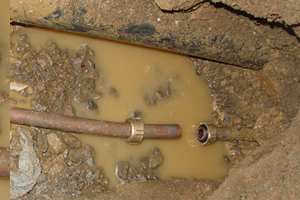
Plumbing and gas line leaks are some of the most common callouts for professional plumbing companies. This article will help you understand repiping and alternative choices for slab leaks and gas leaks.
Slab Leak Repiping and Alternatives
In San Diego, most buildings use slab-on-grade construction for their first floors. These thick concrete slabs provide a low cost, solid foundation perfectly matched to our climate. But they pose slab leak repair problems for any plumbing underneath them, whether water supply line, interior hot and cold pipes, or sewer lines.
Detection
A water leak can go undetected for quite some time, and even become fairly large, without your knowledge. But make no mistake, an un-repaired slab leak will lead to major damage sooner or later.
If you’ve experienced an increase in water usage, sudden or gradual, that seems to have no explanation, noticed discoloration and unusual moist areas as well as hot or cold spots on floors, walls, and ceiling; or in advanced stages, mold, odors, or cracks in the walls or ceiling, it’s time to get a slab leak detection expert’s professional diagnosis.
Repair Options
Depending on the nature of the leak and the building’s plumbing, you’ll have one or more options for slab leak repair. An ASAP professional will take the time to explain your choices and provide up-front pricing. That way you can make an informed decision before proceeding. They may recommend spot repair, rerouting and repiping, or trenchless pipe lining.
Gas Line Repiping
If you suspect a gas leak, that’s a major emergency. Stop what you are doing and call San Diego Gas and Electric, or your local gas company immediately. Symptoms of a leak include a rotten egg smell or in extreme cases you may hear a hissing. Many leaks occur outdoors from underground lines. Here you may only notice dead vegetation, but in some instances you might see bubbling in wet areas or dirt blowing from the ground.
Listen to the podcast below and read our gas line page for things you must do right away.
Benefits of Repiping
Repiping means replacing or rerouting existing lines. Why would you need repiping? To fix chronic problems and avoid future hazards, problems, and interruptions.
Until recently, most gas lines were galvanized steel. These lines suffer from rust and other types of corrosion and generally should be replaced after 25 to 35 years. There can also be mechanical damage requiring placement sooner, from accidents, building settling, or vibration for example.
There are new techniques available that can save you money by costing less in labor and lasting longer. The latest installations may use PE pipes for underground locations and CSST or Trac-pipe for above ground locations. In some situations, trenchless installation can mean that line repiping doesn’t have to involve digging up your landscaping or breaking through floors, driveways, or patios.
- Replacing old pipes removes serious health and safety risks to you and your family
- Increases flow rates, improving the efficiency of appliances
- Improves safety measures by helping to avoid cross-contamination
- Helps eliminate waste
- When you take care of a small problem now, a bigger and more expensive problem can be avoided.
Repiping – Plumbing and Gas Lines Experts
ASAP Drain Guys & Plumbing employs experienced plumbers who are happy to evaluate the condition of your existing piping. We are leak detection specialists, equipped with the latest equipment for detecting and localizing leaks. Our skilled plumbers can walk you through your choices and each step along the way towards solving plumbing or gas repiping issues.

